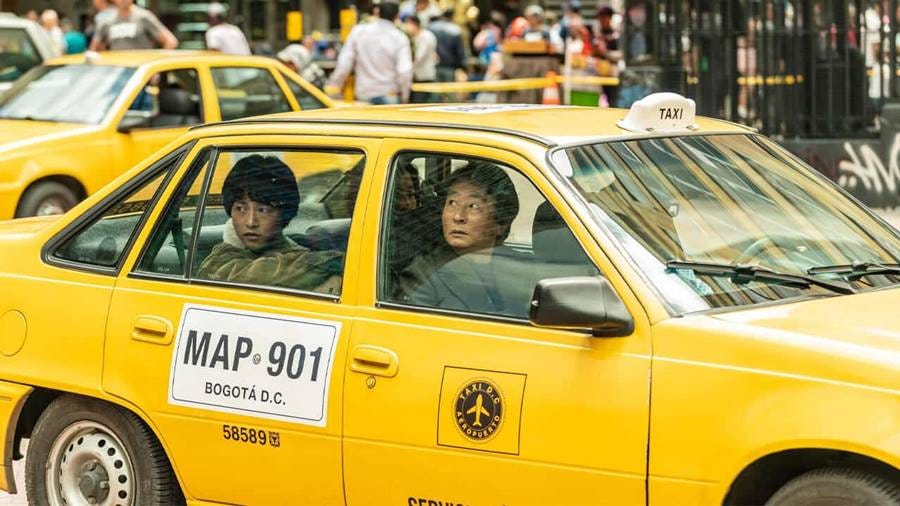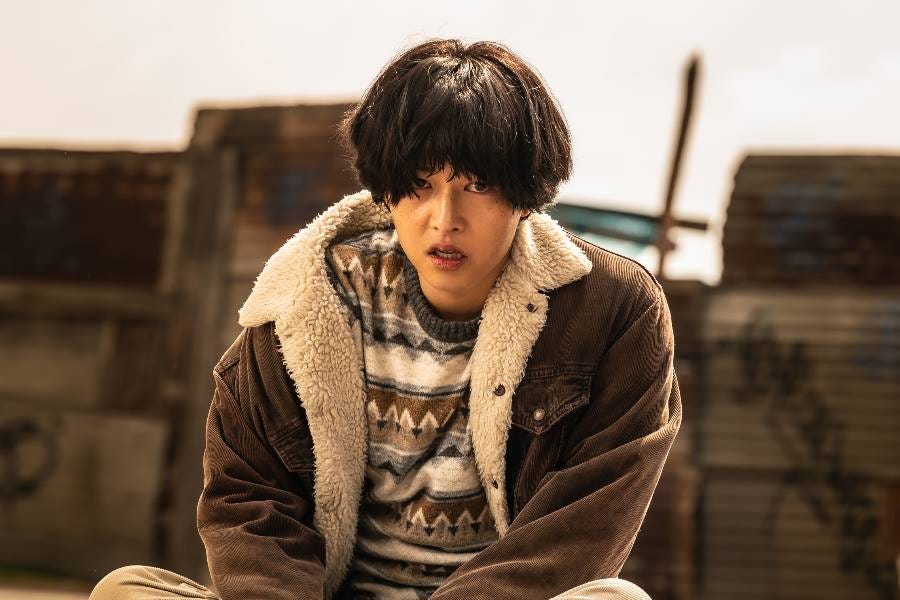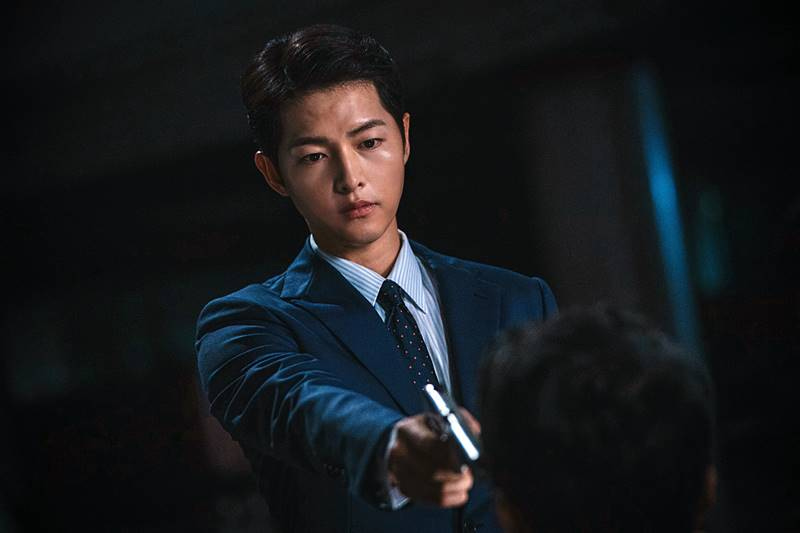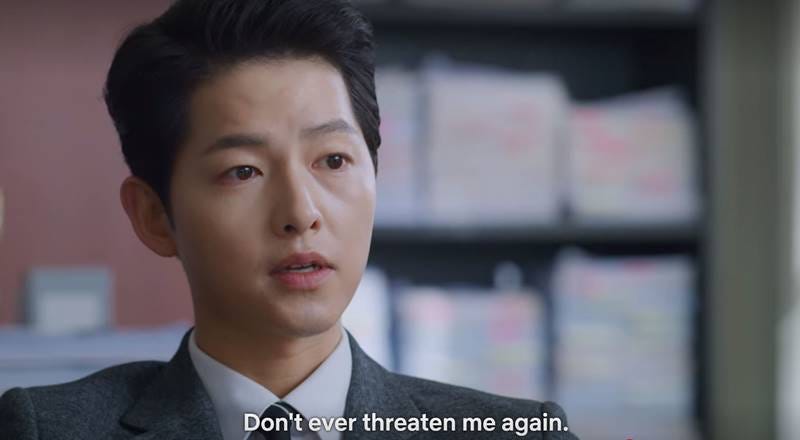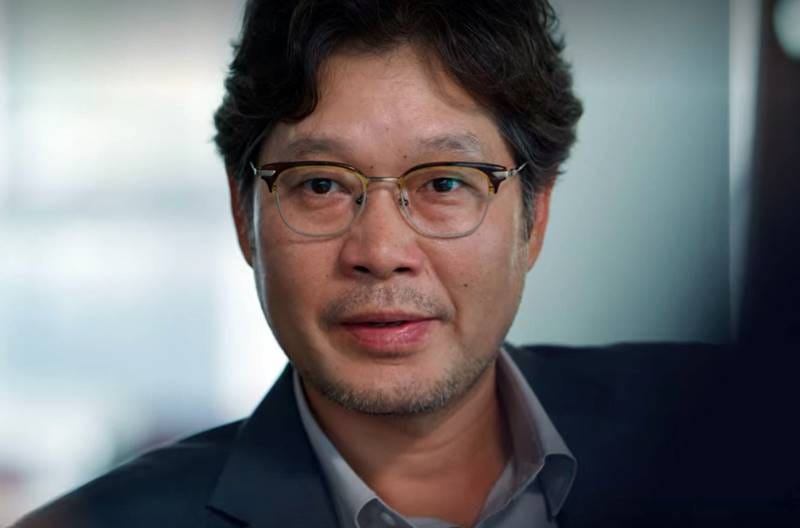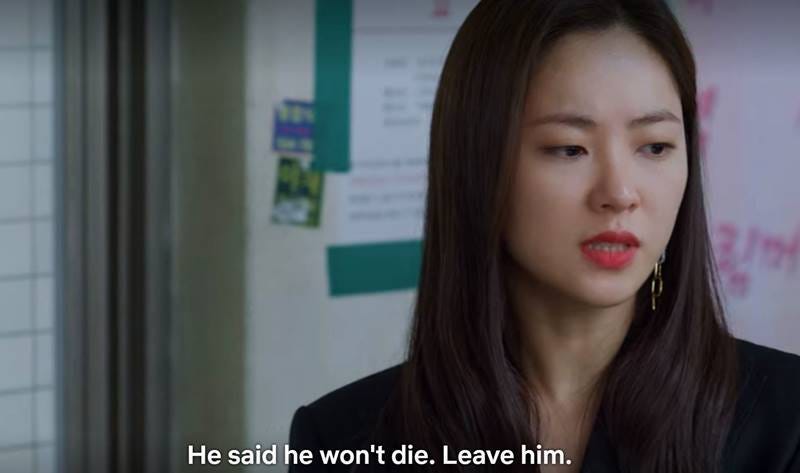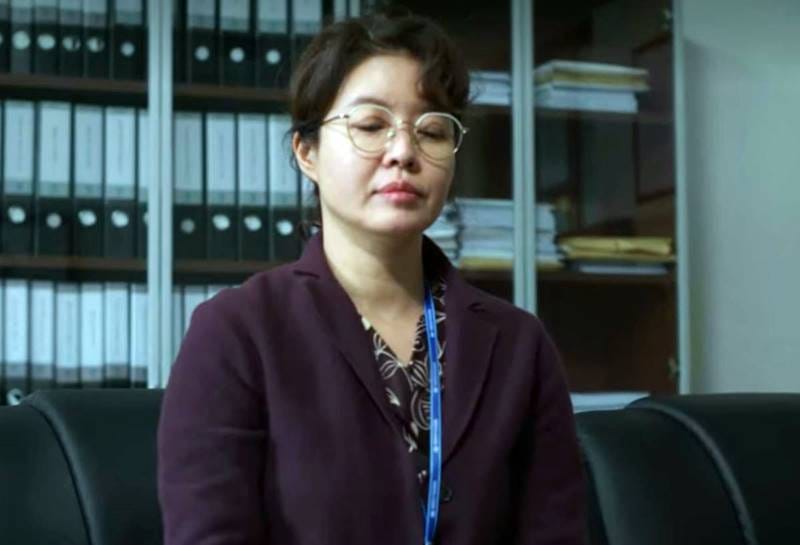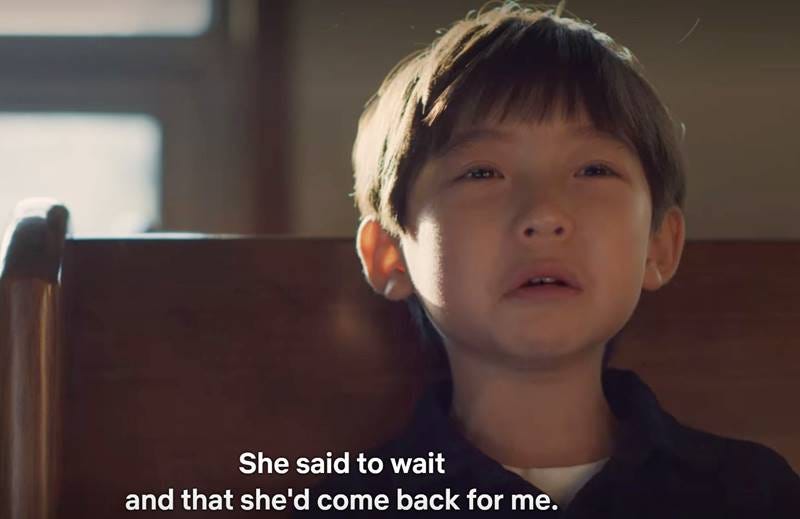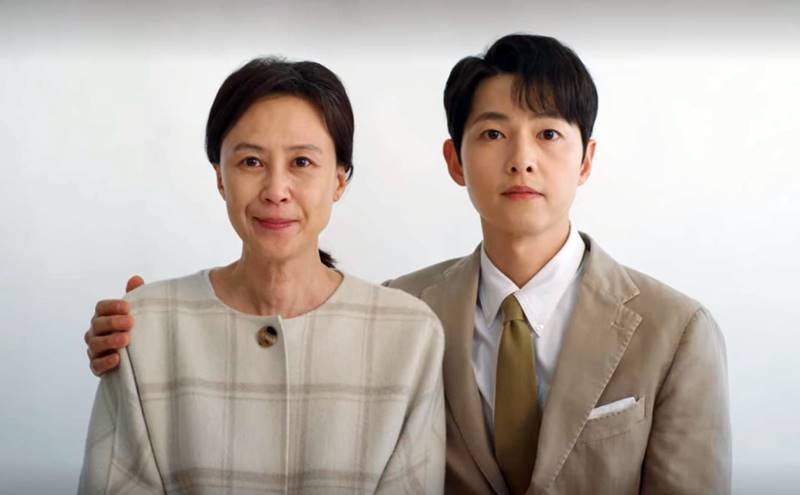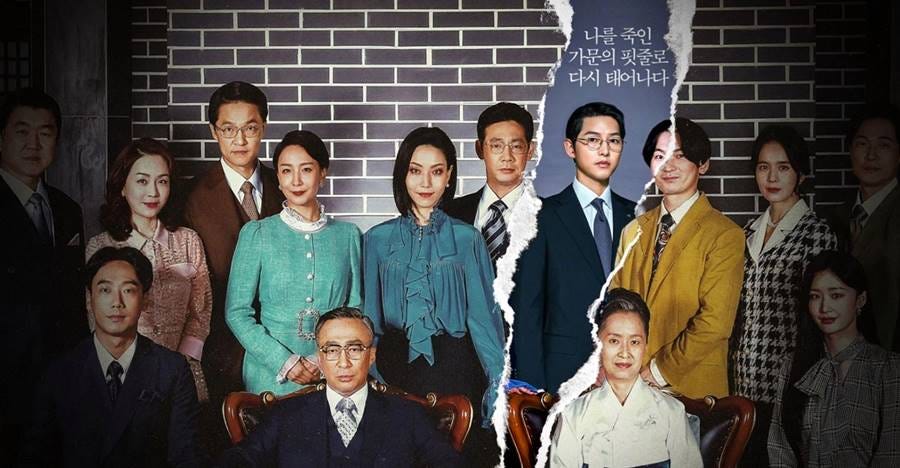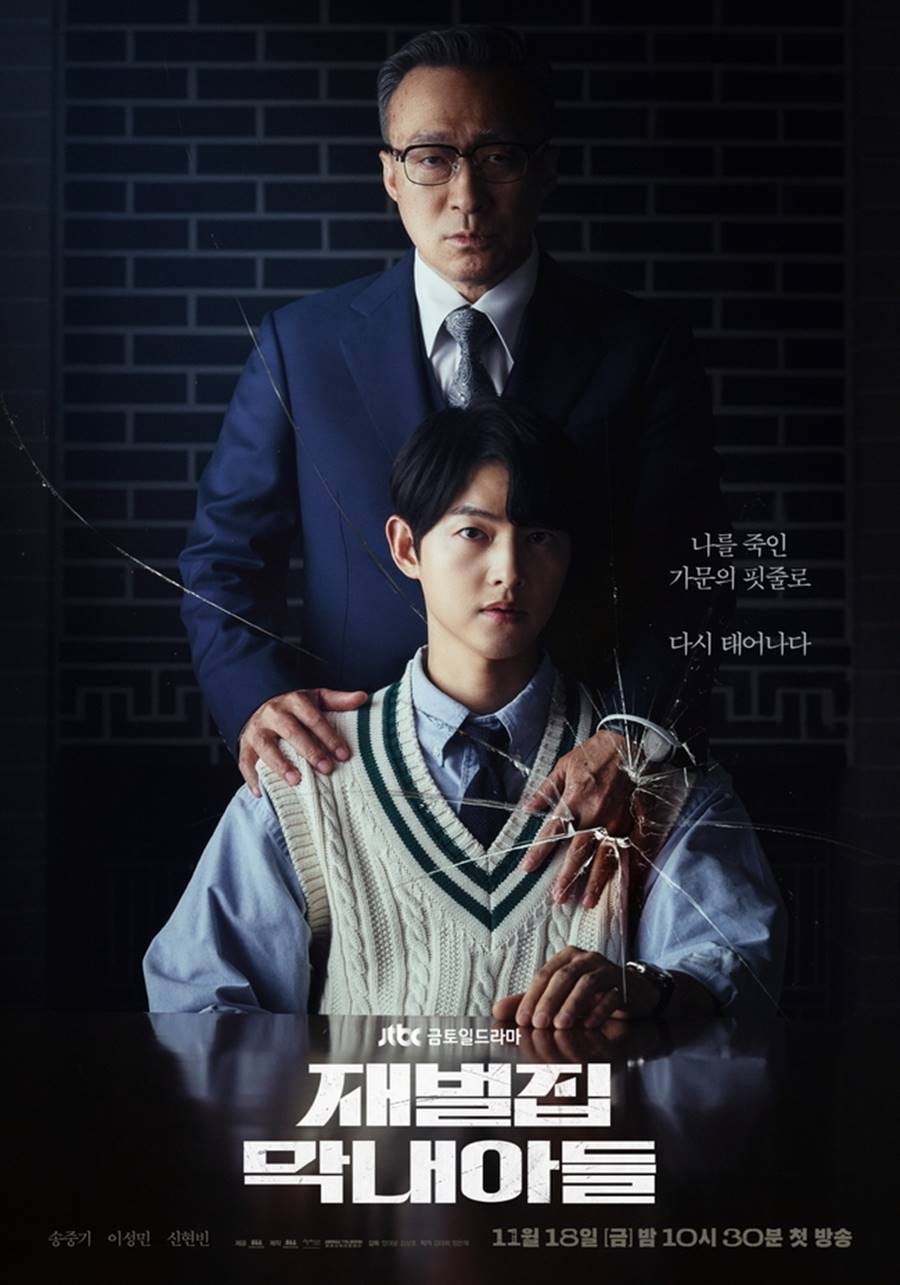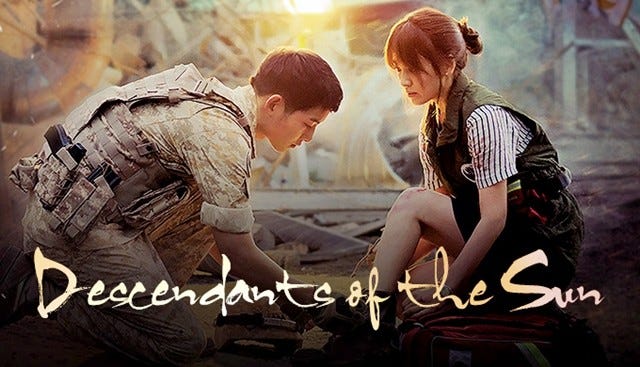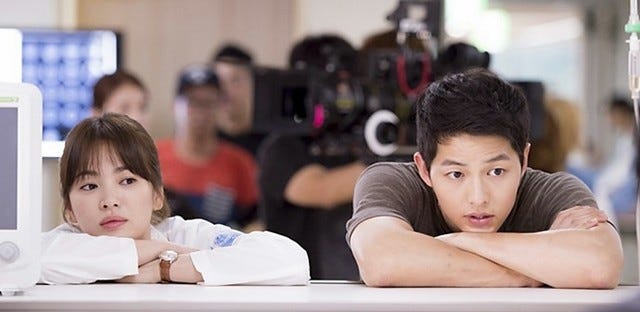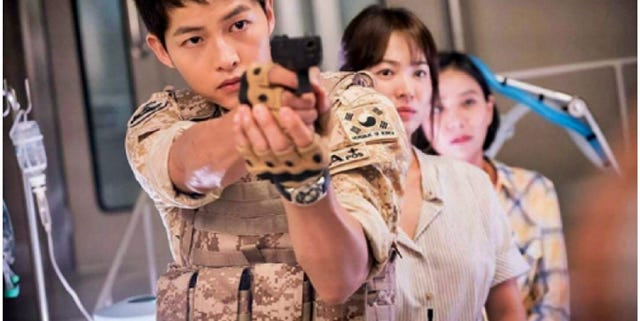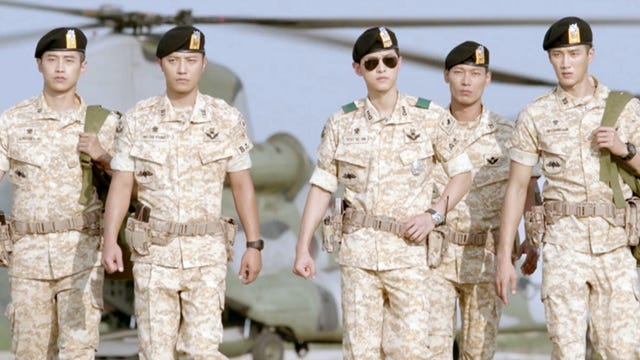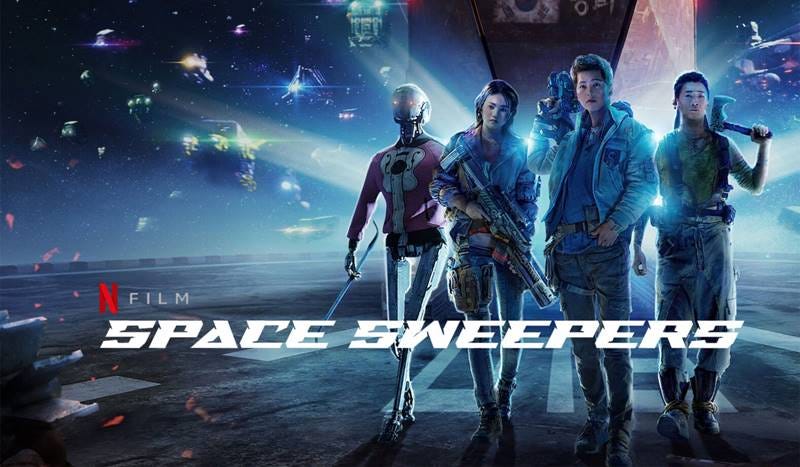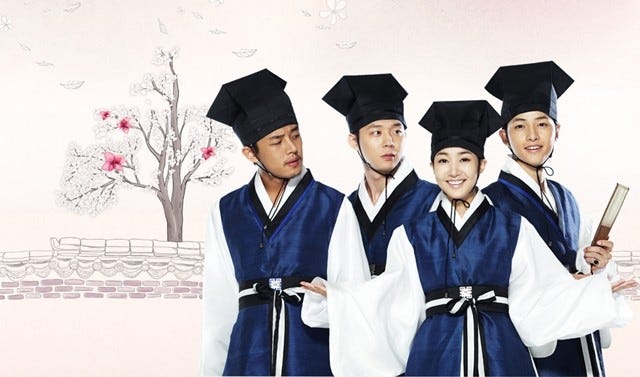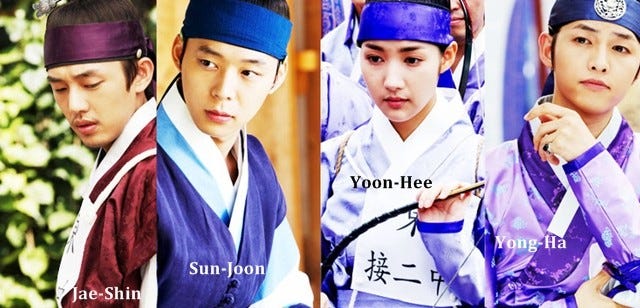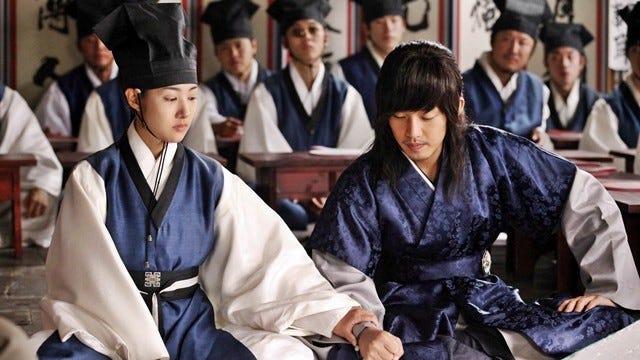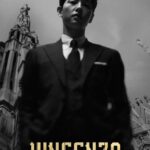Song Joong-ki’s “Bogotá: City of the Lost” is Much Ado About Nothing
My family was so excited to watch Song Joong-ki’s latest film, “Bogotá: City of the Lost,” earlier this year when it made premiered on Netflix. But it wasn’t long before we found the meandering plot and weak direction disappointing.
I like Song very much as an actor. But I’ve noticed his best work tends to be in K-dramas. Maybe there’s something to be said for getting to grow into a role over multiple episodes.
So as a palate cleanser from “Bogotá,” I wanted to share some of my favorite Song Joong-ki K-dramas, and take a look at his previous film “Space Sweepers,” as well:
????️ Bogotá: City of the Lost
Descendants of the Sun
Reborn Rich
????️ Space Sweepers
Sungkyunkwan Scandal
Vincenzo
These are my final K-drama reviews for the month, so I hope you enjoy reading them. And, as always, my reviews are based on a ☆☆☆☆ scale.
“보고타: 마지막 기회의 땅”
☆☆☆☆
Guk-hee (played by Song Joong-ki)
Soo-yeong (played by Lee Hee-joon)
↑Note: Korean names denote the surname followed by the given name.
There was a lot of anticipation for this latest Song Joong-ki film. But while “Bogotá: City of the Lost” had an exciting premise, it ultimately fell flat.
The film begins after the Asian Financial Crisis (ca. 1997-1998) had wreaked havoc throughout East Asia. Seeking a better life for his family, Guk-hee’s father decides to start anew in Colombia. The plan is to open a shop in Bogota for a few years, earn more money and then immigrate to the United States.
Their first day in Bogotá sets the tone for what their life will become (and what viewers can expect). Robbed by an armed thief who steals all their money and legal documents, they end up worse off than when they were in South Korea. But now they’re in a country where they have no friends or relatives, and have to rely on Jang-soo (Kwon Hae-hyo), who had served in Vietnam with Guk-hee’s father, and is the king of Bogotá’s closely-knit Koreatown.
Song, who was in his late 30s when he starred in this film, is a good actor. However, asking him to portray Guk-hee from the time he’s 19 through his 30s is a stretch. The film would’ve benefitted by casting a younger actor for the first third of the movie.
Starting off as a shy and smart 19 year old, Guk-hee doesn’t seem like he could grow up to be a fearless and cold-blooded mob boss. But when his father deals with their squalid life by turning to alcohol and squandering away their meager earnings, the boy makes the decision to better their lives at the expense of others. He starts off working in the Colombian black market, smuggling in undergarments from Korea.
As different factions fight over their respective fiefdoms, there is a lot of underhanded subterfuge. Whereas good films can make audiences care about horrible characters, that kind of relief doesn’t exist in “Bogotá,” where the backstories aren’t strong enough to make us root for them … any of them. (Honestly? You can get more of a cinematic experience watching Song’s superb K-dramas “Vincenzo” and “Reborn Rich.”)
It’s not out of the question to ask why this family didn’t just return to Korea. But that’s one part of the film that felt truthful. They stayed for the same reason many immigrants remain, rather than returning home. Despite all the hardships, it’s still a better life than the one they left behind.
There is a lot going on in this film — shootings, explosions, backstabbing and double-crossings. But when it’s all over, you realize that it was mostly much ado about nothing.
Airdates: After premiering at the Busan International Film Festival on October 3, 2024, this 108-minute debuted in South Korean movie theatres on December 31, 2024. (I watched this on Netflix.)
© 2025 JAE-HA KIM | All Rights Reserved
빈센조
☆☆☆½
Vincenzo Cassano (played by Song Joong-Ki)
Hong Cha-Young (played by Jeon Yeo-Been)
Jang Han-Seok (played by Ok Taec-Yeon)
Jang Han-Seo (played by Kwak Dong-Yeon)
↑Note: Korean names denote the surname followed by the given name.
There is so much going on in “Vincenzo” that it could have been a sensory overload. But screenwriter Park Jae-Bum and director Kim Hee-Won created the series in such a way that even with all the subplots, viewers aren’t overwhelmed by the various storylines or the cast of characters that grow on you with each and every episode. When there is a sense of urgency with some of the plot points, Park and Kim take their time in letting the story unfold in a believable way. Well, as believable a story as you can have about a Korean-born child who ends up becoming a consigliere for a top mafia don in Italy.
There was a sense of loss throughout this series. For the protagonist, Vincenzo, he lost his mother and birth country in one fell swoop, when her terminal illness forced her to give him up for adoption. But for other characters, they, too, were driven by loss on a grand scale. Hank-Seok showed early signs of being a psychopath as a young boy. But instead of getting him a psychiatrist to treat his homicidal anger, his father shipped him off to the United States, letting his disease fester overseas. Why? Because he was a horrible parent, who didn’t want to acknowledge that his child had serious issues.
Born to a poor woman whose health was faltering, Park Joo-Hyung was adopted to a family in Italy, who renamed him Vincenzo. He eventually worked his way up the mafia ranks to become the Cassano family’s consigliere. After the don dies, he flees Italy to escape his adoptive brother, who views him as a rival and wants him dead. He returns to his birth country, but it’s not because he feels any ties to South Korea. Rather, it’s to take home one and a half tons of gold bars that he had stashed away in Geumga Plaza for a Chinese billionaire. (Did anyone else notice the plaza’s name? Geum/금 means gold in Korean. ㅋㅋ) With the latter dead, the gold is now his. He thinks it’ll be easy to move the tenants out of the dilapidated building into a new one he’s offering to them for free.
He would be wrong.
The tenants are a mishmash of weirdos, who have banded together to create their own version of family. They include a cranky dry cleaner, an Italophile chef whose cooking isn’t as authentic as he leads others to believe, an ajumma who sells tteok-bokki snacks in her little cafe, a morose piano teacher who looks like she stepped out of “The Ring,” and married pawnshop owners whose level of physical strength may be greater than they let on.
One thing is for certain: Everyone develops a crush on Vincenzo at one point or another. And it’s the men who fawn over him more than the women.
Vincenzo forms an alliance of sorts with Hong Yoo-Chan (Yoo Jae-Myung), an idealistic attorney, who fights for justice, even when he knows he won’t be able to win the case. His adversaries include the lawyers at Wusang, who will do whatever it takes to protect the Babel Group. The latter is such a powerful conglomeration that it has bought the loyalty of the country’s most powerful players. And Yoo-Chan is disappointed that his daughter has chosen to work for Wusang.
Eventually, Cha-Young leaves Wusang to fight the dirty attorneys she used to work for.
It’s easy to root for Vincenzo and #TeamGeumga and present them as the wronged heroes. But in many ways, this is a series where everyone is dirty. Wusang and Babel are vile, but they aren’t hypocrites. They see nothing wrong in killing others to protect themselves. Vincenzo is like them in this respect. He will do what it takes to right wrongs done to him and his family.
The Geumga residents and Cha-Young know they are breaking the law by helping Vincenzo. But when the law is stacked against them and the only way they can get justice is by breaking the law, it seems like a valid — and even somewhat of an honorable — option.
But. It’s still illegal.
There are many villains in this series, but one of the greatest is Choi Myung-Hee (Kim Yeo-Jin), a former prosecutor who was recruited by Wusang to work with Babel Group. Initially, she seems like a somewhat harmless lawyer who likes to Zumba in her office and win at all costs. But it’s the at all costs part that proves to be problematic. She is as evil and cold-blooded as the clients she is hired to protect.
This series, though, belongs to Song Joong-Ki. The change in his facial expression — from grief, to anger, to full-on revenge mode — lets viewers know everything he is thinking without a word being said.
Meta Moment: One of Vincenzo’s aliases in this series is that of Tae-Ho. That was the name of the character Song Joong-Ki played in the film, “Space Sweepers.”
Airdates: Twenty episodes aired on tvN from February 20 to May 2, 2021. Each episode ran about 70- to 90-minutes long.
Spoiler Alert: Ok Taec-Yeon starts off in the series playing a bumbling associate/intern at Wusang. He is happy go lucky and has a huge crush on Cha-Young. In reality, he’s Jang Han-Seok, who not only killed classmates when he was a student, but also his own father. He brutalizes his younger half brother Han-Seo (Kwan Dong-Yeon) on a regular basis. Near the end of the series, Han-Seo’s story arc developed beautifully. Starved for familial affection, he found a brother figure in Vincenzo.
There is a slow simmering romance between Vincenzo and Cha-Young that never reaches its full potential. And I liked it that way. This series was more about righting wrongs and seeking vengeance, than it was about date nights and shared kisses (although there are a couple of those as well).
Because Vincenzo follows through on destroying Wusang — which includes taking down all the major players — there is no way he can remain in Korea after the carnage he creates. But he is able to buy a small island near Malta, where he created a kind of safehouse for his family. It’s implied that Cha-Young will join him there, at least for a visit.
Adoption Element: When Vincenzo was eight years old, his mother — who was too sick to take care of him — sent him to a child welfare center. Her hope was that she would recover enough to get custody of her son again. But with her health faltering and wanting a better life for her son than she could give him, she left him there, where he was eventually adopted by an Italian couple.
It’s not clear if the couple renamed him or he still went by his Korean name during his youth. But after a robber killed them, Vincenzo joined the mafia, where he got revenge by killing his parents’ murderer. The powerful Cassano family don treated him like his own son and my guess is that’s when Park Joo-Hyung became Vincenzo Cassano.
Which leads me to Vincenzo knowing how to speak Korean. It’s highly unlikely that Vincenzo could be completely fluent in Korean without having grown up with parents who spoke it to him on a daily basis and/or having immersed himself in Korean studies in Korea, where he only spoke Korean for a considerable period of time. From what he said about his previous visits to Seoul, he didn’t. He was in Korea at least once before to handle business. But he left the country once business was completed. Even if he had taught himself to speak Korean, how was he able to parse Korean news stories, much less contract law in Hangul?
I really wish K-drama scriptwriters would stop implying that adoptees have this muscle memory to retain a language they knew for a handful of years as a child. That’s not how it works. Some Koreans expect real-life adoptees who were raised in Western countries to be able to speak and understand Korean simply because they look Korean. And many adoptees have spoken about how they were shamed when they couldn’t speak their native tongue.
It would’ve been nice if they gave a little backstory about Vincenzo’s language skills, just like how they explained Hae-Seok’s fluency in English. (Remember? His father sent him to hide in the U.S. for a few years after he became a serial killer).
Vincenzo and his mother (Yoon Bok-In) get to spend some quality time together before she is killed. Both knew they were mother and son, but neither acknowledged it out loud to each other. That, I think, is one of Vincenzo’s biggest regrets: He didn’t get to tell her that he loved her and forgave her for doing what she thought was best at the time.
“재벌집 막내아들”
☆☆☆½
Jin Do-joon / Yoon Hyun-woo (played by Song Joong-ki)
Jin Yang-chul (played by Lee Sung-min)
Seo Min-young (played by Shin Hyun-been)
Rachel (played by Tiffany Young)
↑Note: Korean names denote the surname followed by the given name.
Describing “Reborn Rich” is tricky without giving away the ending. Is this K-drama a time-traveling thriller? Or a revenge series with the poor battling the obscenely wealthy? Maybe it’s a tale of repentance?
The answer is: It’s all that and more. There’s a reason why this was most-watched K-drama of 2022 in South Korea. Smart and calculated without resorting to tired tropes, “Reborn Rich” offers powerhouse performances by Song Joong-ki (in two roles) and master actor Lee Sung-min (“Misaeng“), who at just 54, convincingly portrays the former’s mercurial-tempered grandfather.
When we first meet Hyun-woo, he is the perfect employee. Smart (but poor and uneducated), he is made to believe he is lucky to have a corporate job at Soonyang, one of South Korea’s most powerful companies. As he advises an underling, his job is to complete any and all orders from his superiors without question. This includes everything from swapping out a hotel toilet seat for the wife of the chairman’s eldest son, to traveling overseas to reclaim the company’s slush funds.
This isn’t much of a spoiler since it is advertised in the series synopsis, but still … stop reading if you don’t want to know more. (I’ll write about the major spoilers beneath the trailer below.)
During this trip, he is set up, shot and falls from a cliff. The knowledge he possesses about the family’s dirty deeds have been protected by his death.
In the next vignette, we meet Do-joon, the youngest grandson of the Soonyang Group family. (The literal translation of the Korean series title 재벌집 막내아들 is The Youngest Son of a Chaebol House.) He is about 10 years old and confused. Because Hyun-woo’s spirit and mind are now in the little boy’s body.
From that point on, Hyun-woo begins to plot his revenge. But as is pointed out in the series, revenge isn’t for those who have been wronged. Only those with power can truly get retribution in any meaningful way. So he carefully plots out his future, knowing what he knows from having lived it and from having read his grandfather’s biography (which hasn’t been published yet in the era he’s currently living).
His goal is to find the Soonyang member who ordered his death, take control over the conglomerate and make sure that the family members are punished for their wrongdoings. But in the 15 or so years he lives as Do-joon, he grows to love and respect his grandfather Yang-chul — the family patriarch who is well aware that his obsequious and duplicitous sons and daughter aren’t qualified to take over his business. Using his knowledge of what will happen in the future, Do-joon makes bold predictions that prove to be lucrative. And there’s no better way to win over Yang-chul than to make his company even more successful.
He also makes enemies of his uncles and aunt who view him as an unqualified threat — not because he’s not bright, but because Do-joon’s father isn’t their real brother, but merely a half brother.
Song Joong-ki’s love interest here is a prosecutor (played by Shin Hyun-been of “Hospital Playlist”). But the series is driven not by the promise of romance, but by the cat-and-mouse relationship between Do-joon and Lee Sung-min’s Yang-chul. It’s a battle of wits between two cunning men who are too pragmatic to wholly trust each other.
Acting aside, “Reborn Rich” is a fascinating look at South Korea’s modern history, when South Korean cars were viewed as cheap automobiles that could never enter the international market. And its electronics and goods weren’t of comparable quality to products made in the United States, Germany or Japan. It deals with the ramifications of the IMF crisis, when leaders were asking its citizens to donate all their gold jewelry (including wedding bands and babies’ dol rings and bracelets) for the good of the nation. And in Episode 13, there’s a fun reminder of how well South Korea performed two decades ago at the 2002 World Cup, before eventually losing to Germany (1-0) in the semi-finals.
I have seen a few things on social media where fans are upset at the finale. For me, it was a satisfying end to a well-crafted show that felt natural and hopeful. Surviving is an act of courage in and of itself. While it’s not a sexy happily ever after, there is definitive closure and repentance.
Meta Moments: Girls’ Generation’s Tiffany Young has a nice co-starring role here as a finance expert who works with Do-joon. And ATEEZ‘s Jong Ho shows off his powerhouse vocals in “Gravity,” which is featured prominently in the K-drama’s OST.
Airdates: Sixteen episodes — ranging from 60- to 75-minutes each— aired on JTBC from November 18 to December 25, 2022.
Spoiler Alert: In the finale, Hyun-woo realizes that what happened to him wasn’t a fluke: “I finally know now that this wasn’t about possession or time traveling. It was repentance — my repentance for Jin Do-joon and for me, Yoon Hyun-woo.”
Hyun-woo was left for dead in the first episode. But a savvy prosecutor who had been keeping tabs on the Soonyang family had a NIS team following him. He hadn’t died. He was rescued.
In Episode 12, we learned that the person behind the murder attempt of Yang-chul and Do-joon — who she didn’t realize would be traveling with his grandfather — was … Yang-chul’s wife. When she saw that her husband was favoring Do-joon over their own children, she wanted her husband knocked off. She resented him and hated Do-joon for standing in the way of her kids.
In one of the small story arcs that ticked me off, Do-joon helped his grandmother flee overseas so that she won’t be imprisoned. Do-joon’s dad sees her off, and forgives her, saying that he understood what she must have went through, raising a boy (him) who had a different mother. WHAT? She. Not. Only. Tried. To. Kill. Your. Father… She. Almost. Killed. Your. SON! I could never.
We saw at the end of Episode 1 that Hyun-woo was betrayed by his underling Gyeong-min (portrayed by Park Jin-young). In the finale, we find out that the person who ordered the murder of Do-joon was his oldest uncle, who wanted to ensure that the chairman position would be passed down to him and then eventually his son.
At that time, Hyun-woo was working as a laborer for the Soonyang Group. His assignment that day was to drive a small truck to a destination that didn’t seem to exist. He got out of his car to call his boss for clarification. A semi truck came barreling down the road, hitting his truck, which rammed into the sedan in front of him. Do-joon was a passenger in the car and died in the crash. And had Hyun-woo made the call from within his car, his life would’ve been over as well.
I don’t think Hyun-woo realized at the time that the chaebol family was aware that he could die (and they didn’t care). His options are to go to the police and report the crime. Or, to accept the white-collar position to work at the company. He chose the latter.
The one plot point I found unbelievable (even for a fictional show) is that when he finds himself living as Do-joon, he has no memory of the man. Only later does he realize that he was the youngest grandson who had died tragically. Given that he was at the scene of the crime, wouldn’t Hyun-woo realize that he had been a party (unwittingly) to his murder?
태양의 후예
☆☆☆☆
Captain Yoo Shi-Jin (played by Song Joong-Ki)
Dr. Kang Mo-Yeon (played by Song Hye-Kyo)
First Lieutenant Yoon Myung-Ju (played by Kim Ji-Won)
Sergeant Major Seo Dae-Young (played by Jin Goo)
↑Note: Korean names denote the surname followed by the given name.
A beautifully-filmed series with attractive leads, “Descendants of the Sun” is essentially a love story set in a military backdrop.
The Korean drama begins with Captain Yoo Shi-Jin and Sergeant Major Seo Dae-Young apprehending a low-level thief. Through their interactions, we see that the two are best friends, funny and much more skilled than your average military officers. They are, in fact, part of Korea’s elite Alpha Team.
Shi-Jin’s love interest is Dr. Kang Mo-Yeon, a hard-working physician who is cynical and somewhat childish when it comes to relationships. Dae-Young’s complicated alliance is with First Lieutenant Yoon Myung-Ju, who is an Army physician. She is the daughter of a three-star general, who respects Dae-Young as a soldier, but doesn’t think he’s worthy of marrying his daughter.
Production on the epic series began just three months after Song Joong-Ki finished his mandatory two-year military duty in Korea. He displays an easygoing flair in the role of the charismatic leader of the Alpha Team. Even bulked up (for him), Song is slight of build and baby faced. At times, I wondered whether someone like So Ji-Sub would’ve been better cast in the role. But, what he lacks in brawn, Song makes up with magnetism. He has one of those faces that the camera loves.
Portraying his love interest, Song Hye-Kyo had a more thankless role. Though Mo-Yeon is a brilliant doctor, she often came across as immature. The actress essentially was stuck in the girlfriend role.
Filmed in South Korea and Greece, which stood in for the fictional war-torn Urek, the series also includes several white characters, who are supposed to be Americans, Eastern Europeans and Urekians. I’ve touched on this in some of my previous reviews, but some of the most unfortunate acting in Kdramas comes via non-Korean “actors,” who are hired primarily because they don’t look Asian. The two young women hired to play a sexy barmaid and a teenager about to be trafficked are undoubtedly beautiful, but they couldn’t act their way out of a box. The same for most of the men who portrayed mercenaries. Their acting is so bad that, by comparison, Hayden Christensen should’ve won an Academy Award for his wooden performance in the “Star Wars” trilogy.
It’s a sad commentary on the state of cinema in the U.S. when a tiny country like Korea — which has almost no non-Korean actors living there — goes out of its way to include Western faces into their productions. And the U.S. — which has a wealth of talented American actors of Asian ethnicity — is still reticent to include Asian-American characters into films.
To me, the bromance between Shi-Jin and Dae-Young was much more layered and interesting than the romances. Hell, I found Shi-Jin’s interactions with a North Korean soldier more moving than most of the time he spent with Mo-Yeon.
But, when the men infiltrated various underworld international crime rings, I was on the edge of my seat. Similarly, when the women were in the operating room, I was pulling for them to save (most of) the patients.
The Korean Arm Grab: Long-time readers of my K-drama reviews know that I can’t stand the Korean Arm Grab. This occurs often, when a woman is walking away. Instead of saying, “Oh, hey…” the man forcefully grabs the woman’s arm to restrain her. WTF? Anyhow, my favorite moment in this 16-hour series occurs halfway through Episode 4, when Dae-Young tries to end a conversation with Myung-Joo by walking away. She is his military superior and shows her rank by doing the Korean Arm Grab on him, forcing him to turn around. I. Loved. It!
American accents: Most of us who speak English as a primary language should thank our lucky stars that we happen to speak a language that opens doors for us internationally. We can go teach English overseas without knowing any other language. We will find people who know our language in major cities across the ocean. We can travel comfortably without feeling “lost” in many situations, because we can communicate simply by speaking English.
When I was younger, there were very few U.S. programs that showed Asians or Asian Americans. When “MASH” was on, I remember my parents and I chuckled at the Asian American actors who were phonetically speaking Korean. To us — as Americans who spoke both English and Korean — their Korean sounded ridiculous. But, to my friends who didn’t speak Korean, they didn’t think anything of it.
Which made me wonder, do native Korean speakers (who aren’t fluent in English) care that the white people in these shows — who are supposed to be native English speakers — do a horrible job of speaking English? Or, because they’re hearing a language they’re not familiar with, do they just read the subtitles and go with the flow?
And on the same train of thought, do they care that the Korean actors speaking English often don’t sound like they learned to speak English overseas?
On another one of my posts, a reader and I were commenting back and forth about some of the Korean characters in this series and how they didn’t seem convincing when speaking in English. Mo-Yeon makes fun of her language abilities, saying that she wishes the English-speaking person she was speaking with would learn Korean, so that she wouldn’t have to continue speaking to her in “broken English.” But Shi-Jin had studied in the U.S., since he graduated first in his class from West Point.
The general consensus is that the older you are when you learn a new language, the more difficult it will be to speak like a native speaker. This is one reason why so many Koreans try to send their children to English-speaking countries — it’s not enough to speak English, but there’s more prestige in being able to speak it without a Korean accent. For the majority of Koreans, this isn’t feasible, since it is cost-prohibitive to send a child (and usually the mom) to Australia, England or the U.S. for several years.
I thought that the actors did a good enough job reciting their lines in English and that Song Joong-Ki got his emotions across. However, instead of having the Korean actors speak English to the foreigners, I think it’d be more effective to have the non-Korean actors speak in Korean. Yes, their Korean will be poor, but in most cases, so is their acting — so would it even matter? And with subtitles in hangul underneath, Korean viewers will understand what is being said in “broken Korean.”
After all, these are fictional dramas where all the soldiers are handsome and buff and don’t die even after being blown up by bombs. Why is it implausible, then, that a random foreigner could speak passable Korean?
What do you all think?
Airdates: KBS2 aired this 16-part series in Korea from February 24 to April 14, 2016. Three specials (basically recaps with some interviews thrown in) aired from April 20 through the 22nd.
Spoiler alert: In Episode 15, it appears that Shi-Jin and Dae-Young die. No doubt, viewers were pissed off that there wouldn’t be a happy ending for the primary couples. Have no fear! It is explained in the final episode that they were “saved” by enemies, who then tortured them for a year to try to extract information from them. Of course, our heroes didn’t crack.
All the people who seem like they should couple up do. And the ending is satisfying and romantic.
(승리호)
☆☆½
Kim Tae-Ho (played by Song Joong-Ki)
Captain Jang / Jang Hyun-Sook (played by Kim Tae-Ri)
Tiger Park (played by Jin Seon-Kyu)
“Space Sweepers” has a lot of things going for it — great acting, cinematography, special effects. But once you’re done oohing and ahhing at the visual onslaught, it’ll sink in that what the film lacks is a cohesive storyline.
Song Joong-Ki (“Vincenzo“) and Kim Tae-Ri (“The Handmaiden,” “Mr. Sunshine“) star as part of the crew of Victory, a salvage ship that collects junk around Earth’s orbit to sell or use to sustain life on Earth.
Their enemy is the smarmy cult-like leader James Sullivan (Richard Armitage), who at 150 years old has a financial stake in keeping Earth unlivable. His corporation runs idyllic space colonies, where the rich and powerful can live without running into the poor. Though the movie doesn’t go into it much, Sullivan didn’t reach 150 by exercising and eating right. After he murders an inquisitive man who questions his dubious methods, Sullivan’s body is invigorated with strength.
Set in 2092, the film is helmed by Jo Sung-Hee, who first had success with the 2012 feature film, “A Werewolf Boy” / “늑대소년,” which also featured Song Joong-Ki.
Whether intentional or not, Jo’s space odyssey reminded me too much of the “Star Wars” films, “Blade Runner” and “The Fifth Element.” Even though the film is populated with a predominantly Korean cast, its storyline is too familiar to be considered anything more than a fun movie. Viewers can guess what will happen next and they’ll be correct.
I had no problem with the over two-hour run time. But I wish that time had been used more judiciously to flesh out central plot points. This could’ve been a truly revelatory dystopian space movie, tackling the haves and the have nots and the moral implication of preying on the poor, whose work doesn’t get them out of debt, but exacerbates it with fee and taxes. (Sound familiar, anyone? You don’t have to go to space to see how this is playing out in just about any society today.)
As mentioned earlier, all the actors do a great job with what they are given. Song played his conflicted role with the right amount of charm and pathos, while Kim Tae-Ri was perfect as the iron-fisted captain, whose leadership no man would dare to question. Then there was an ass-kicking robot named Bubs, who identified as a woman, and no one gave her flack for that.
Release date: Originally slated to premiere in South Korean movie theaters on September 23, 2020, the 136-minute film was delayed due to the COVID-19 pandemic. Instead, it released internationally on Netflix on February 5, 2021.
Running time: 2 hours 16 minutes.
Spoiler Alert: Tae-Ho had once been an elite soldier/killing machine. After slaughtering a group of immigrants, he feels bad enough about his actions to take the sole survivor — a baby girl — to raise as his own child. Reconciling himself to the harm his actions have caused, he refuses to kill on demand, which means his loses his job and privileged position. Now homeless and poor, he spends his time gambling in the hopes of providing a better life for Su-Ni and himself. During a catastrophe, he is separated from her. He spends the next three years trying to scrap together enough money to pay a service that can find anyone — for a hefty fee. In the end, he is unable to be reunited with her, except in a dream sequence that gives him a little bit of the closure he needs.
성균관 스캔들
☆☆☆☆
Kim Yoon-Hee / Yoon-Shik (played by Park Min-Young)
Lee Sun-Joon (played by Park Yoo-Chun)
Gu Yong-Ha (played by Song Joong-Ki)
Moon Jae-Shin (played by Yoo Ah-In)
If you commit a crime against a system that is gender biased, is it really a crime? And, just as importantly, should you be punished?
Yoon-Hee is an impoverished girl who is her family’s sole breadwinner. Her father is deceased, and she has a mother and sick younger brother to support. Industrious and smart, Yoon-Hee learns that people will pay her to write their reports and take their exams for them, if they think she’s a boy. So, she borrows her younger brother’s name and disguises herself as Yoon-Shik.
Through a series of circumstances she didn’t initiate, Yoon-Hee finds herself enrolled at the prestigious all-male Sungkyunkwan University. Though she’s well aware that she will be executed if anyone reveals her secret, Yoon-Hee falls in love with the adademic lifestyle, the camaderie and the three square meals a day.
Of course, she will eventually also fall in love with one of her classmates. There’s the richly-dressed and impish Yong-Ha, who loves nothing more than to stir things up. His polar opposite and best friend is the mysterious Jae-Shin, who is a social justice warrior in the literal sense.
Then there’s stoic and straight laced rule follower Sun-Joon, whose world is black and white. He sees no reason for grey. Coming from a privileged background, he has never gone hungry and doesn’t have to worry about rules, because rules were made by and for people like him. When his eyes are opened to poverty and those who have no privileged background to fall back on, that’s when he truly grows up.
Because Yoon-Hee is easily the tiniest student, the other young men give her a hard time at first, nicknaming her girly boy, pretty boy and flower boy. But when she more than holds her own academically and in athletic competitions and, more importantly, wins the favor of the era’s most famous kisaeng, her classmates are under the impression that Yoon-Hee is quite the Romeo and nickname her Big Shot.
“Sungkyunkwan Scandal” is a love story, but it’s also a mystery in many ways, as the Joseon-period Scooby Gang tries to discover a missing scroll that entails the previous king’s wishes for a society without class distinction. It all sounds like a good idea, but if the caste system was eliminated, then what would become of the royal family? Would the king have been willing to live as a commoner?
It wasn’t too long ago that girls were discouraged from continuing their education, and this series makes it painfully obvious what happens to women when they are reliant on men for survival. When her mother is unable to pay her bills, the Minister of War decides that he will take Yoon-Hee instead. Enrolling in Sungkyunkwan allows the education that was denied her, but it also allows her to escape a life where she will at best serve as his concubine.
It’s not a huge surprise to learn that the Minister of War’s son, In-Soo–who happens to be the student body president with a ridiculous amount of authority–becomes Yoon-Hee’s biggest enemy at school.
The question of homosexuality arises when several of the boys are attracted to Yoon-Hee, who they believe is a young man. Questioning his attraction, Sun-Joon asks Yong-Ha if he has ever been attracted to another man. Yong-Ha admits that he was once attracted to Jae-Shin and adds, “Hating people is a sin. How could liking them be one?”
Yessssssssss!
The series goes by quickly and (for the most part) is engrossing. I could’ve done without all of Yoon-Hee’s crying, which made her appear much weaker than her male classmates. In that kind of school situation, her crying would’ve made her ripe for being bullied.
Though she bound her chest to appear male, most women will wonder how she hid her monthly cycle from her roommates. You can suspend your belief in reality to overcome that dilemma, but I wondered why none of her enemies did a little sleuthing of their own. Had they gone to her village and asked around, they would’ve seen the real Yoon-Shik at home with their mother. And even if they didn’t find him, they would’ve learned from Yoon-Hee’s neighbors that they hadn’t seen her in months. It would’ve been easy enough to figure out that the tiny boy at school, who looked like a girl, actually was one.
The ending is satisfying, with everything falling into place as it should. But moreso than the ending, my favorite scene was when her brother revealed to Yoon-Hee that their father wanted her to learn, but didn’t know how to do so in a society that made it illegal for girls to obtain higher education. (The real) Yoon-Shik pointed out that when he was a toddler, their father would read to him, always picking higher level books than he could understand. Sitting by the door with him on his lap, their father would read in a loud voice so that Yoon-Hee could listen to the lessons as she waited outside. The lessons weren’t for Yoon-Shik, but for her.
Gay rights:
It was interesting to me that though homosexuality was treated as an aberration–as it would’ve been during the Joseon era–the writers also pointed out that more important than punishing “deviants” was understanding and loving everyone, regardless of their sexual orientation. In a day when homosexuality is still treated as a perversion in Korea and, yes, in many parts of the U.S. as well, it is heartwarming to see these Korean dramas present it is something that just is. You don’t choose to be gay, just as you don’t choose to be born.
Frustration:
Whenever someone became angry, but had to present an even-keeled persona, they balled their fists up in frustration. I enjoyed this, because it’s something little kids do; and it made some of the more unlikable characters a bit more human.
You may recognize:
• Many new Song Joong-Ki fans sought this drama out after watching him in “Descendants of the Sun.” Coincidentally, he is a graduate of the real Sungkyunkwan University.
• Kim Min-Seom, who played the hated Queen Bo-Kyung in the “Moon Embraces the Sun,” portrays a much more sympathetic character here: a highly cultured, but low-caste kisaeng named Cho-Sun. When Yoon-Hee, dressed as a boy, shows her kindness, Cho-Sun falls in love with her.
• Kim Mi-Kyung portrays Yoon-Hee’s mother. In “The Master’s Sun,” she played So Ji-Sub’s fashionable aunt.
• In this series, Ahn Nae-Sang plays a professor, who knew and respected Yoon-Hee’s father. In the “Moon Embraces the Sun,” he portrayed Kim Soo-Hyun’s father — the king.
Airdates: This 20-episode Korean drama aired from August 30 to November 2, 2010 on KBS2.
Spoiler alert: Yoon-Hee’s father was a revered Sungkyunkwan professor who was killed while carrying out a mission for the king. It’s not clear why her mother kept this tidbit from Yoon-Hee and her brother, but it was most likely to protect their lives. He and Jae-Shin’s older brother were murdered while trying to help the king implement plans for a country where there were no class distinctions.
What’s puzzling is the fact that Yoon-Hee’s father had ties to the king and Sungkyunkwan University, and yet no one helped out his family after his death. The least the king could’ve done was ensured that his widow and children would have a a roof over their heads and food on the table.
In episode 15, Sun-Joon tries to revive Yoon-Hee, who he rescued after she fell in the river. When he opens her shirt, her bound bosom is revealed. Now, he knows that she is a girl.
The final episode shows that In-Soo — the evil student body president — is capable of showing humanity to those he love. When his father tries to strike Cho-Sun, In-Soo defies him to protect her.
©2025 JAE-HA KIM | All Rights Reserved

